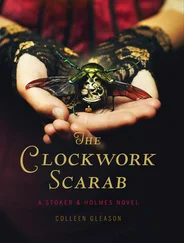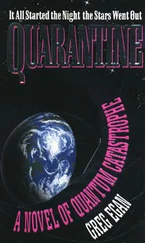Greg Egan - The Clockwork Rocket
Здесь есть возможность читать онлайн «Greg Egan - The Clockwork Rocket» весь текст электронной книги совершенно бесплатно (целиком полную версию без сокращений). В некоторых случаях можно слушать аудио, скачать через торрент в формате fb2 и присутствует краткое содержание. Жанр: Фантастика и фэнтези, на английском языке. Описание произведения, (предисловие) а так же отзывы посетителей доступны на портале библиотеки ЛибКат.
- Название:The Clockwork Rocket
- Автор:
- Жанр:
- Год:неизвестен
- ISBN:нет данных
- Рейтинг книги:3 / 5. Голосов: 1
-
Избранное:Добавить в избранное
- Отзывы:
-
Ваша оценка:
- 60
- 1
- 2
- 3
- 4
- 5
The Clockwork Rocket: краткое содержание, описание и аннотация
Предлагаем к чтению аннотацию, описание, краткое содержание или предисловие (зависит от того, что написал сам автор книги «The Clockwork Rocket»). Если вы не нашли необходимую информацию о книге — напишите в комментариях, мы постараемся отыскать её.
The Clockwork Rocket — читать онлайн бесплатно полную книгу (весь текст) целиком
Ниже представлен текст книги, разбитый по страницам. Система сохранения места последней прочитанной страницы, позволяет с удобством читать онлайн бесплатно книгу «The Clockwork Rocket», без необходимости каждый раз заново искать на чём Вы остановились. Поставьте закладку, и сможете в любой момент перейти на страницу, на которой закончили чтение.
Интервал:
Закладка:
When her turn came, a guard unclamped her chain from the wall and ushered her in front of the sergeant’s desk.
“Are you Yalda, daughter of Vito?”
“Yes, sir.” The sound of her father’s name stung; Yalda had no wish to imagine him witnessing any of this.
The sergeant scanned the paper in front of him. “You are charged, firstly, with possession of a substance contrary to the order of nature and the public good. Do you dispute the charge?”
“No, sir.” In the darkness of her cell she’d rehearsed speeches on the insanity of banning a drug that spared the world fatherless children, fantasizing about the power of her impeccable logic to sway even the most hostile audience.
“On that charge, I fine you a dozen pieces.”
“Thank you, sir.”
The sergeant glanced up at her, irritated, as if her anxious tic might actually be taken to imply that the fine was lenient. “Secondly, you are charged with a grievous assault against the person of Acilio, son of Acilio, four nights ago in the square outside the Variety Hall. I have statements from six witnesses to the effect that you threw a sharpened stone that struck him and caused substantial injuries. Do you dispute the charge?”
“No, sir.”
“Do you have anything to say in mitigation?”
Yalda hesitated. Surely an honest answer would not be treated as hostility or disputation? Why ask about mitigation if you had no wish to hear the truth?
“Sir, Acilio did throw the stone at me before I assaulted him with it. It only struck me lightly, but that’s how I came to have it in my hand.”
The sergeant re-examined the paper in front of him then slid it aside and gazed up at her coldly. “What witnesses do you name for this accusation?”
“None, sir,” Yalda admitted. “Most people were looking at the sky,” she explained, “and my friend was on the other side of the square.”
“Then I fine you two dozen pieces for a gratuitous and cowardly libel,” the sergeant said, “and a further dozen for wasting my time.”
Yalda’s skin quivered, as if her body believed it could rid her of this strange insect that kept taking bites out of her flesh.
“As for the assault,” the sergeant continued, “the complainant has requested a payment of a dozen gross pieces in reparation, an amount with which I concur. Additionally, on behalf of the citizens of Zeugma, I fine you a further gross. Your total fine is a dozen-and-one gross and four dozen pieces. How will you pay this?”
Yalda couldn’t speak. Even Daria, with the fees from her public dissections, wouldn’t make that much in a year; for Tullia or Lidia it would be a lifetime’s wages.
“How will you pay?” the sergeant repeated impatiently.
“I can’t,” Yalda said. “I don’t have anything like that.”
The sergeant hummed wearily. “I don’t expect you to pluck that many coins from your pocket, you simpleton. Just give the messenger the name of someone who can organize the money for you.”
“There’s no one who can do that,” Yalda insisted. A dozen gross? She couldn’t burden Tullia with that surreal demand; she couldn’t bury all her friends in impossible debts. “Can’t you… reconsider the size of the reparation?” she pleaded.
“What I’ll do,” the sergeant said, his tone now sarcastically good-natured, “is return you to your cell for a stint, so you can reconsider the resources at your disposal.” He gestured to the guard.
As she was led back down to the basement, Yalda kept tripping on the stairs. The guard waited for her to right herself; perhaps the sheer size of her fine had impressed him to the point where any further mistreatment was superfluous.
He said, “You should pick your fights more carefully.”
Yalda said, “I didn’t even know who he was.”
The guard buzzed with mirth. “You do now.”
At first, Yalda refused to believe that things were as they seemed. A dozen gross pieces? It had to be a kind of cruel joke, a punishment for her “cowardly libel”. After a day or two she’d be hauled before the sergeant again and told what the true fine would be.
But as she heard the bells marking the end of her sixth day in prison—with the spoilt grain that she’d spurned at first, then scrabbled for blindly, now entirely gone—she experienced a moment of clarity. A part of her, she realized, had been laboring under a strange assumption: that people with the power to release her would be spending their days pondering her fate, agonizing over her hardship, questioning her punishment’s severity. And since no one was entirely devoid of feeling… anything truly intolerable to her would, in the end, be intolerable to them. Any treatment so unjust that it threatened to crush her spirit would, in the end, wear down their resolve to impose it.
But it was not like that at all. The sergeant, the guards, the Council, her accuser, buttressed by each other’s mutual approval, shared the burden of her imprisonment so equitably that it became no burden at all. No one , individually, was responsible for what they’d done to her in concert. She could die in this cell, and none of them would feel the faintest twinge of discomfort.
All she could do now was wait out the stint, then send an honest message to Tullia explaining her situation. She would not let her friends go into debt, but if they told her story to everyone at the Solo Club, perhaps some of the wealthier customers would be sympathetic to her plight. Perhaps over a year or two the money could be raised.
A narrow bridge of flesh had formed again between her sleeved arms. Yalda tugged at the fibers angrily, jerking and tearing them until the last one snapped. However long she stayed here, it wouldn’t be the guards who set her free.
On the morning of her eighth day of imprisonment, Yalda woke to find something hard on the floor when she moved her feet. She picked up the grains one by one until she had a handful, then she tipped them carefully into her mouth.
Why did she need food at all? Why not just make light, and get the energy she needed for free? She wasn’t growing, like a child; she didn’t need to add new matter to her body.
But the matter she did have was growing disordered; the microscopic building blocks of her flesh were slipping into disarray. Soil for a plant, food for an animal, offered more than materials for growth and repair: it was a source of low entropy . The rock from which it came was highly ordered—and without order, energy was useless, as likely to push you one way as another. Life rode the arrow of time that came from the world’s slow decay.
But now that she had a little order in her body, what was she going to do with it? Her captors wouldn’t let her starve to death, but how would she stay sane?
“All right, Tullia,” she whispered. “I’ll show you the life of the mind.”
Tullia had claimed that if the cosmos resembled the surface of a sphere, Yalda’s equation would render everything absurdly predictable. Her argument had sounded plausible, but Yalda wanted a deeper understanding of the problem before she abandoned the whole idea.
On a sphere, she realized, the fundamental solutions of her equation would be spherical harmonics : a kind of waveform she’d encountered once before in a course on seismology. Whatever complicated solution held across the whole surface of the sphere, it could be written as a sum of these harmonics, each multiplied by a suitable factor measuring the size of its contribution.
Yalda worked through the calculations, raising equations on her skin in the dark. First, you fixed the physical parameters: the radius of the sphere and the wavefronts’ separation. Then, as the wave’s frequency with respect to longitude rose, its frequency with respect to latitude would fall. Since you always had to wrap whole numbers of waves around the equator and around any meridian, in the end there were only a finite number of possibilities—a finite number of relevant harmonics.
Читать дальшеИнтервал:
Закладка:
Похожие книги на «The Clockwork Rocket»
Представляем Вашему вниманию похожие книги на «The Clockwork Rocket» списком для выбора. Мы отобрали схожую по названию и смыслу литературу в надежде предоставить читателям больше вариантов отыскать новые, интересные, ещё непрочитанные произведения.
Обсуждение, отзывы о книге «The Clockwork Rocket» и просто собственные мнения читателей. Оставьте ваши комментарии, напишите, что Вы думаете о произведении, его смысле или главных героях. Укажите что конкретно понравилось, а что нет, и почему Вы так считаете.










